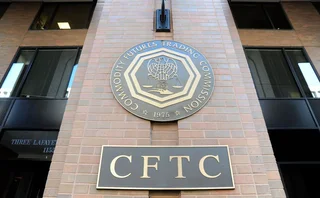
CFTC seeks trading venue equivalence in Asia
As it strives for a seamless Brexit, the CFTC also nears deals with Asian jurisdictions

Having taken steps to ensure trading venue equivalence with the UK as it hurtles toward Brexit, the United States has been trying to do the same, quietly, in Asia.
Amir Zaidi, who heads market oversight at the Commodity Futures Trading Commission, was discussing the agency’s efforts to achieve comparability with the UK, when he mentioned he was working on something similar in Asia.
“For the Asian jurisdictions, we have been in discussions since last year with a few jurisdictions,” he said. “We are making great progress and coming more towards the final stages of some of those comparability determinations. I do expect a few more in the coming weeks and months, so you will have to stay tuned for that.”
Zaidi would not be drawn on details, but promised official announcements soon.
He made the comments at DerivCon in New York on February 27. Brexit was front and centre at the gathering, with many speculating on possible convolutions and how the UK might later diverge from its current standards once it is no longer tied to Europe.
“US Sefs [swap execution facilities] and UK multilateral trading facilities are equivalent,” said Gregory Compa, US head of compliance at Tradeweb. But for British firms, unfettered access to EU venues is far from guaranteed.
“Will there be a UK/EU equivalence [deal]?” said Compa. “We assume there will be, at least for a time; but there is the potential that regulations could diverge in future, and what will that look like?”
In 2017, the CFTC agreed with the European Commission to consider their trading venues comparable. This week, the CFTC, along with the Bank of England and Financial Conduct Authority, reassured derivatives traders that they were “taking steps” to ensure Brexit does not create regulatory unknowns for them.
Zaidi said the CFTC has already started working on a comparability determination with the UK.
But Compa warned the edifice of equivalence may be more fragile than it appears. “There is a lot of change coming up in the EU in this next year, with elections for the EU parliament. What are their views going to be on equivalence?” he said.
Under Christopher Giancarlo, the CFTC has taken the line that sovereign nations should recognise one another’s compliance based on the premise that the regulatory regimes are equally rigorous. Giancarlo has fought to maintain hard-won comparability determinations on clearing houses after Brexit threatened to disrupt that.
Reporting from all corners
While progress has been made on clearing and trading equivalence, reporting requirements remain the purview of each host country. Matthew VosBurgh, director of regulatory execution compliance at Barclays, says regulatory swap data reporting should be harmonised. Reporting to multiple regulators with conflicting and duplicative requirements is already costly.
“When you don’t have equivalence, [you have to] be able to make sure that for any given trade that is being reported to all the people that want to see it, and make sure you are able to isolate exactly what this regulator wants to see or that regulator wants to see – that’s where we have the challenge,” he said.
Upcoming rules in the EU could introduce more uncertainty. An initiative called the regulatory fitness and performance programme (Refit) will tweak exisiting dual-sided reporting requirements, which the US doesn’t have, says VosBurgh.
Giancarlo has been adamant the CFTC will not switch to a dual-sided model, where both sides of a swap transaction have to be reported.
“Refit places more of an onus on the larger firms to conduct this reporting, which means it formally creates a delegated reporting framework for larger firms like Barclays and other major counterparties,” says VosBurgh. “So not only are we subject to multiple regimes we are also reporting for multiple counterparties.
Zaidi responded that the CFTC 2017 “roadmap” to streamline reporting requirements will include some harmonisation elements, and the effort is near completion. The commission has been involved in international initiatives to standardise data elements, such as the legal entity identifier, and is leveraging the experience gained on the world stage to improve the US regime, said Zaidi.
Work on the roadmap is somewhat behind schedule, said Zaidi. But he has submitted the first phase to the commission’s general counsel for approval, and it will soon go to the commissioners for voting.
This first stage, or “bucket”, as Zaidi called it, streamlines swap data repository requirements, he said.
“The second bucket focuses on real-time reporting and regulatory reporting, critical data elements and other fields.” This second will follow closely on the first, he said.
Only users who have a paid subscription or are part of a corporate subscription are able to print or copy content.
To access these options, along with all other subscription benefits, please contact info@risk.net or view our subscription options here: http://subscriptions.risk.net/subscribe
You are currently unable to print this content. Please contact info@risk.net to find out more.
You are currently unable to copy this content. Please contact info@risk.net to find out more.
Copyright Infopro Digital Limited. All rights reserved.
As outlined in our terms and conditions, https://www.infopro-digital.com/terms-and-conditions/subscriptions/ (point 2.4), printing is limited to a single copy.
If you would like to purchase additional rights please email info@risk.net
Copyright Infopro Digital Limited. All rights reserved.
You may share this content using our article tools. As outlined in our terms and conditions, https://www.infopro-digital.com/terms-and-conditions/subscriptions/ (clause 2.4), an Authorised User may only make one copy of the materials for their own personal use. You must also comply with the restrictions in clause 2.5.
If you would like to purchase additional rights please email info@risk.net
More on Regulation
US Basel equivalence questioned as EU patience wears thin
MEPs say unfaithful US implementation of Basel III could trigger review of access to EU markets
The Term €STR transition: challenges and market readiness
The progress, challenges and factors shaping the adoption of Term €STR as financial institutions transition from Euribor
CFTC takes red pen to swaps rules, but don’t call it a rollback
Lawyers and ex-regs say agency is fine-tuning and clarifying regulations, not eliminating them
EU edges closer to calming FRTB fund-linked fray
Dealers say temporary solution is a step in the right direction but won’t fully resolve all issues
European Commission changes tune on proposed FRTB multiplier
Banks fear departure from original diversification factor undermines case for permanent relief
Supervisors should be mindful of geopolitical risks, says IMF
Shock events cause sizeable swings in asset pricing, institution’s latest report highlights
Bowman won’t commit to stress-testing the tariff shock
Nominated Fed vice-chair stonewalls calls to run ad hoc scenario similar to 2020 Covid test
Fed’s Bowman to ‘prioritise’ SLR exemption for US Treasuries
Reinstating Covid-era relief is a ‘no brainer’, dealers say, as bond markets reel from tariff chaos







